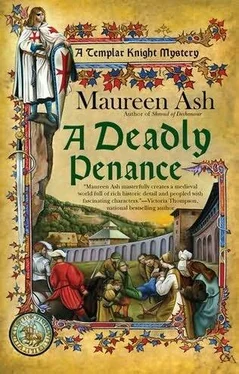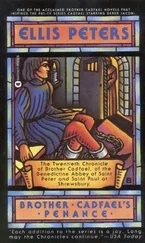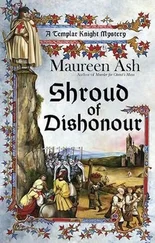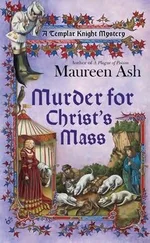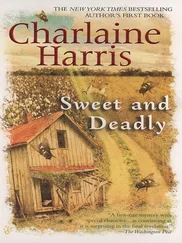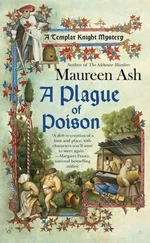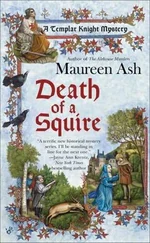MAureen Ash - A Deadly Penance
Здесь есть возможность читать онлайн «MAureen Ash - A Deadly Penance» весь текст электронной книги совершенно бесплатно (целиком полную версию без сокращений). В некоторых случаях можно слушать аудио, скачать через торрент в формате fb2 и присутствует краткое содержание. Жанр: Исторический детектив, на английском языке. Описание произведения, (предисловие) а так же отзывы посетителей доступны на портале библиотеки ЛибКат.
- Название:A Deadly Penance
- Автор:
- Жанр:
- Год:неизвестен
- ISBN:нет данных
- Рейтинг книги:5 / 5. Голосов: 1
-
Избранное:Добавить в избранное
- Отзывы:
-
Ваша оценка:
- 100
- 1
- 2
- 3
- 4
- 5
A Deadly Penance: краткое содержание, описание и аннотация
Предлагаем к чтению аннотацию, описание, краткое содержание или предисловие (зависит от того, что написал сам автор книги «A Deadly Penance»). Если вы не нашли необходимую информацию о книге — напишите в комментариях, мы постараемся отыскать её.
A Deadly Penance — читать онлайн бесплатно полную книгу (весь текст) целиком
Ниже представлен текст книги, разбитый по страницам. Система сохранения места последней прочитанной страницы, позволяет с удобством читать онлайн бесплатно книгу «A Deadly Penance», без необходимости каждый раз заново искать на чём Вы остановились. Поставьте закладку, и сможете в любой момент перейти на страницу, на которой закончили чтение.
Интервал:
Закладка:
Willi was forced to nod his head in agreement, and Mark, who felt he owed it to his new friend to dissuade him from a foolish course of action, said, “You knows as how you’d be a right silly beggar to leave and go back to Lincoln, don’t you? We’s got everything we needs here. Why go back there and be hungry and freezin’ cold again?”
Willi set his mouth in a stubborn line. “ ’Cos I’se got to go and find my da, that’s why. How will he know where I am? Only orphans is allowed to come to this place and I ain’t one, so he’ll never think to look for me here, will he?”
“But what if that murderer sees you?” Mark asked. “’Spe-cially if your da ain’t come back yet and you got no one to protect you. You could be killed stone dead like that man up on the ramparts.”
“I’ll have to take my chances,” Willi replied stoutly, but despite his brave words, the young boy was fearful. The person he had seen near the tower had looked straight at him as their glances met and was sure to know him if their paths chanced to cross again. Mark was right; it would be more sensible to stay at Riseholme, but Willi was desperate to find his father who, if he had chanced to earn a few pence, might spend it in an alehouse if Willi was not there to dissuade him. His father had not always been a tosspot. They had lived in a village not far from Lincoln until last spring when Willi’s mother had died of a fever. Up until then, his father had worked hard at his trade of thatching and they had a little cot to live in, provided by the high-ranking cleric who held the land in return for the fee of his father’s labour for two days a week. But when Willi’s mother died, his father had taken to drinking all his hard-earned pennies away in the village alehouse and had not turned up for work. When the cleric had threatened eviction if the terms of the fee were not met, Willi’s father decided he would go to look for work in Lincoln, and so they had come to the town. But thatched roofs were not, due to the town’s bylaw, in common use within the town and prospective employers had not been plentiful. On the few occasions that his father had been fortunate enough to earn a few pennies repairing thatch on small buildings such as barns or outhouses in the suburbs, the coins had been squandered in an alehouse before Willi could persuade his father to spend them on food and shelter. Finally, they had been reduced to begging in the street or lining up with other indigents for alms from the church. It had been then that his father had declared he would go back into the countryside to find work and told his son to wait in Lincoln for his return. Willi knew he had to be in the town when his father came back for him; if he was not, they might never see one another again. He would rather take the chance of being murdered than losing his da forever.
As the two boys parted company to attend to their chores, neither of them noticed that Joan, maintaining her usual silence, had crept up close to them and listened to their conversation.
It was almost midday when Stephen Wharton arrived at Lincoln castle. His horse and that of the groom who had accompanied him were flecked with foam from the hard riding they had been put to that morning. After stopping overnight in the guesthouse of an abbey a few miles north of Grantham, Wharton had decided they would start out before first light and the pair had spurred the horses hard for the remaining twenty-odd miles. Wharton was anxious to get his unpleasant errand done with.
After instructing his groom to tend to their mounts, he walked wearily up the steps of the keep’s forebuilding and, upon entering the hall, asked the servant in attendance at the door to inform Lady Petronille that he wished to speak to her urgently.
A little over an hour later, while Richard and Bascot were ensconced in Gerard Camville’s chamber discussing the paucity of information that had been obtained from re-interviewing all of the servants, there was a knock at the door and the Haye steward, Eudo, entered.
“Lady Nicolaa has sent me, Sir Richard,” he said, “with a request that you and Sir Bascot attend to her in the solar. She told me to tell you that the matter is most urgent.”
Fourteen
When Richard and the templar entered the solar they found Nicolaa, Petronille and Alinor seated at the far end of the room in the company of a man who was a stranger to both of them. He appeared to be of middle age and, by the sword he wore at his belt, was of knight’s status. On his face was an expression of apprehension. A little behind Nicolaa’s chair, Gianni sat unobtrusively on a stool, his wax tablet and stylus in his hand, glancing apprehensively at the company around him. The strained look on the countenances of the two sisters bore evidence of tension and Alinor’s delicately arched brows were drawn down in a glower. In her hand, Nicolaa held an unrolled sheet of parchment.
“This is Stephen Wharton, a friend of my brother-by-marriage,” Nicolaa said, introducing the man to her son and the Templar as they approached. “He is also the person, Richard, who recommended that your uncle Dickon give Aubrey Tercel a post in his retinue.”
She paused for a moment as the men all nodded at one another. Then, her voice taking on the determined note that Bascot knew so well, continued, “Wharton has come to tell us a very strange tale about the background of the murdered man. While there is no proof of anything he will relate, the important aspect is that Tercel believed it to be true and, in so doing, may have given someone reason to wish him dead.”
After Richard and Bascot had got over their surprise at Nicolaa’s words, they looked towards Wharton expectantly. The knight took a nervous swallow of wine before he began to recount his tale for a second time. Although neither Nicolaa nor Petronille had evinced any censure of him for keeping Tercel’s fanciful conclusions a secret, Alinor had been furious and still was. She, like her father, saw the repression as a breach of trust and had accused Wharton of placing her mother and herself in possible danger. As the visitor looked at the two men facing him, he felt very nervous of their reaction to his story; would they, like Alinor, find his actions irresponsible?
Taking a deep breath, Wharton began his recounting. “When Aubrey was just a few weeks old, my younger brother, Lionel, brought him to my manor house. Although Lionel never confirmed it, I believed the boy to be my brother’s illegitimate son. He asked me to keep privy the fact that he had given the babe into my care, so together we concocted a tale that the child was the posthumous offspring of my falconer, Bran Tercel, who had taken a chill and died of a congestion in the lungs a couple of months before. We said that my falconer had told me on his deathbed that he had a paramour in Stamford town who was enceinte with his child and begged me to care for the babe after it was born. To explain the absence of the mother, we said that she had died giving birth and her family had given their consent for the boy to be placed in our care. It was a flimsy tale, but it was accepted, and no one questioned it during the years that Aubrey grew to manhood.”
Wharton took another swallow of wine and, knowing the next part would be the hardest to relate, continued. “About the time that I recommended Aubrey be taken into Dickon’s service, my brother had a fatal accident. While out on a hunt, Lionel’s horse stumbled and fell, and in the tangle that ensued, landed on my brother with the full force of its weight, crushing his vital organs. He lived for only a couple of hours and died in extreme pain.”
The knight looked up at the company; his eyes had darkened as he had spoken of his brother’s death. “Since Lionel had never wed, it fell to me to go through the few possessions he kept at the dower property he inherited from our mother. Among them, I found a small package containing a letter that was addressed to me”-he gestured towards the parchment Nicolaa was holding-“and which I have brought with me. It was written some years before, about the time that Lionel left England to follow King Richard on crusade to the Holy Land. I think my brother penned it in case he should not return and, when he came safely back, forgot that it had been written, and left it lying in the chest where I found it. In the letter, among instructions for disposal of his property, there was mention of Aubrey. It said that although Lionel knew I had assumed the boy to be his bastard, this was not the case. It went on to say that Aubrey had been given into his care by someone ‘to whom he owed a debt of loyalty’ and that the reason he had allowed me to be misled as to the boy’s parentage was to prevent the child’s true heritage from becoming known. There was a ring enclosed with the papers that Lionel said would provide a small inheritance for Aubrey and was to be given to him if, and when, I deemed him worthy of receiving it.”
Читать дальшеИнтервал:
Закладка:
Похожие книги на «A Deadly Penance»
Представляем Вашему вниманию похожие книги на «A Deadly Penance» списком для выбора. Мы отобрали схожую по названию и смыслу литературу в надежде предоставить читателям больше вариантов отыскать новые, интересные, ещё непрочитанные произведения.
Обсуждение, отзывы о книге «A Deadly Penance» и просто собственные мнения читателей. Оставьте ваши комментарии, напишите, что Вы думаете о произведении, его смысле или главных героях. Укажите что конкретно понравилось, а что нет, и почему Вы так считаете.
